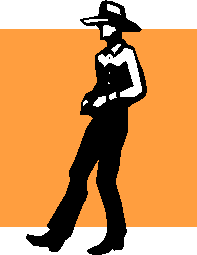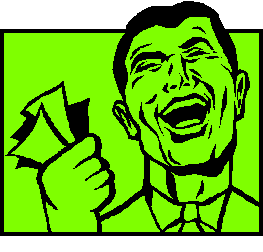Joe Waldron
January 2009

You have a way of walking when you are in a really good mood. Maybe it’s that John Travolta walk from “Saturday Night Fever.” Whatever it is, there is a bounce to your step, a musical rhythm to your walk that simply feels good. Perhaps you need an Ip od plugged into your ear to get in the mood. Whatever your style is, when you get up to shoot, walk to the table with that walk and that rhythm — I’m in a great mood walk. It will put you in the right frame of mind. Use your usual techniques for staying in that mood while you walk around the table and shoot.
Here is why it works. Many years ago Schacter and Singer (1962) were trying to determine if your emotions effect your behavior or if your behavior effects your emotions. The scientists gave something like adrenaline to a group of subjects who thought it was orange juice to see its effect on intellectual performance (yeah we are known for sneaky studies like this).
The pumped up subject is in a waiting room prior to the intellectual performance test. A confederate of the experimenter comes in and sits down next to the subject. In one situation the confederate is angry and makes ugly statements about the experiment, the subject too gets angry as one way of explaining their pumped up system.
In another situation the confederate starts joking around, laughing and throwing paper airplanes at the waste basket. The subject too easily starts laughing and joking around as the explanation for the adrenaline.
There were other conditions to control for possible problems in the study. This study is often cited as one of the better studies in the social sciences and has been replicated many times.
The conclusion is that our emotions follow our behavior. If we act upbeat, our emotions will shift to upbeat. If we act angry, our emotions will be angry. In general, you can change your emotions by changing your behavior (see also Baumeister et al, 2007). If you act upbeat, you will get into an upbeat mood and that will improve your game. Now you can see misses for what they are — a part of the game.
Give it a serious trial; say 15 – 20 minutes of your upbeat walk and personal tempo to get in the right mood for playing pool. From what we know in the experimental sciences it will improve your game. If you fake it until you make it, no one can get you down because your behavior will constantly bring you back to a better state of mind. You enjoy the game for yourself and the other person’s behavior does not affect you.
Another aspect of this type of thinking involves remembering prior experiences. To play pool well one must remember how to execute the shot. In this sense memory is one of several keys to playing well. These memories are not conscious in the sense that we can tell another person what we do. For instance, try to tell another person what you do to coordinate your eyes with the pendulum swing of your arm and the loose grip of your hand to execute a shot. Simply stated, you cannot. However, you do recognize the need for a 33 degree cut with above center follow and slight right hand English to make a particular shot and get position on the next ball. Some place in your head is a representation of prior shots and the ability to adjust the current shot for good control of the game. Some pros have exquisite control.
Is there a way to stuff these types of memories into your head so that they can be easily and quickly recalled? There may be a way to improve the ability of the mind to connect all of the dots as needed.
We all seem to have an ability to remember traumatic events in glaring detail years after the event. Listen to someone tell about their near fatal car accident that they had 20 years ago and they can often tell the story like it happened yesterday. Perhaps we could use something like this with regard to the ability to naturally, unconsciously, remember how to play different pool shots.

The near fatal accident situation involves an extremely high state of attention and probably the flow of different chemicals in the body at the time. None-the-less, we can take a lesson here. If one were to get hyper-emotional immediately after making a shot that is considered well executed, emotionality might help to set the memory in the unconscious. The idea would be to “jump and shout, knock yourself out” when you make the shot exactly as you wanted it. This could set the memory pattern by highlighting it to the brain as something to be remembered.
For those who are not experts at banking here is a way to test the idea that emotional reactions may help remembering how to play a shot. Set seven object balls a diamond off of the long rail. With cue ball in hand, bank each object ball to the nearest pocket. Do this two times and you will have 14 shots. Count the number of times you made the object ball and divide by 14 this is the percentage of correct attempts.
Now practice banking balls using any system that suits you. Ray Martin’s system is particularly effective (99 Critical Shots page 68 – 71). Every time you make the bank shot, “run and shout, knock yourself out.” Or, more specifically, get emotional, yell clap your hands, laugh and in general make a big deal about it. The more emotional you are the better the test will be. You should be at home on your private table or the hall owner might call the nut squad. Continue in this manner until you have made about 20 bank shots.
Now you have to wait a few days. This allows the effect of any prior training to wear off. After a few days your silly one afternoon session should have improved your banking ability.
When you are ready, set up the balls as described above. Play each shot with your usual approach to playing pool and calculate the correct percent as indicated above. If the new training method worked you could expect about a 20 – 30% change in your ability to make banks.

If the system does work it could be used for many other aspects of learning to play well. Of course you might look like a nit but it is about playing pool – right. It makes no difference if you are here or in a psych ward.
From another perspective, I wonder how many excellent players (in whatever sport) have been using something like this. The joy might not be externalized for some but I would bet that some sort of emotionality (maybe even anger) is involved when learning to play well.
References
Baumeister, R.F., Vohs, K. D., DeWall, N., Ahang, L. (2007). How Emotion Shapes Behavior: Feedback, Anticipation, and Reflection, Rather Than Direct Causation. Personality and Social Psychology Review, 2007; 11; 167.
https://psr.sagepub.com/cgi/content/abstract/11/2/167
Martion, R., & Reeves, R. (1993). The 99 Critical Shots in Pool. NY; Random House.
Schacter, S., & Singer, J. (1962). Cognitive, social, and physiological determinants of emotional state. Psychological Review, 69, 379-399.
